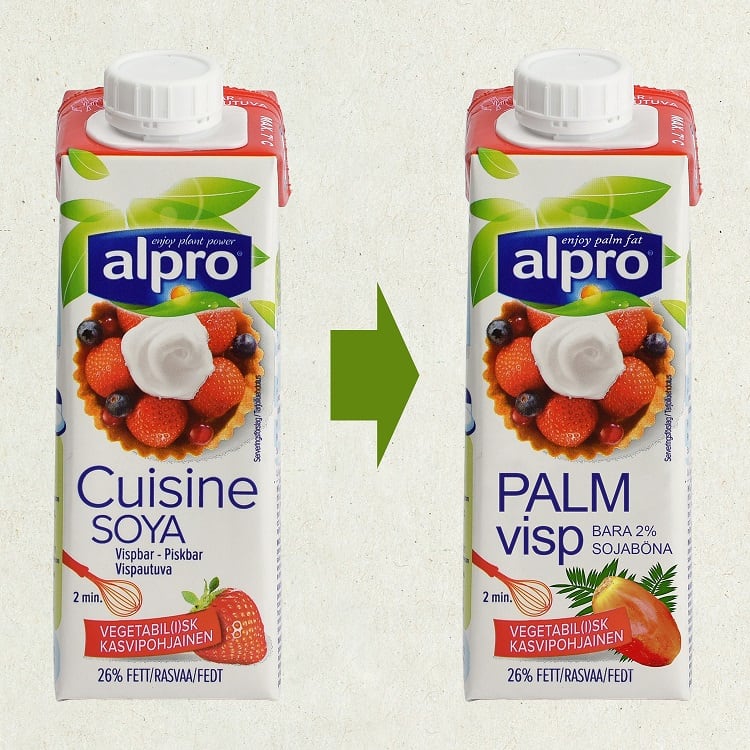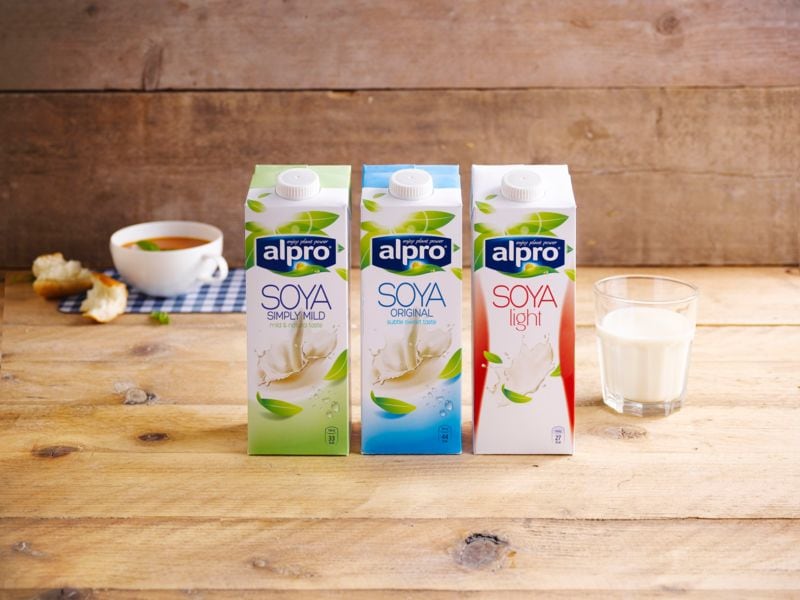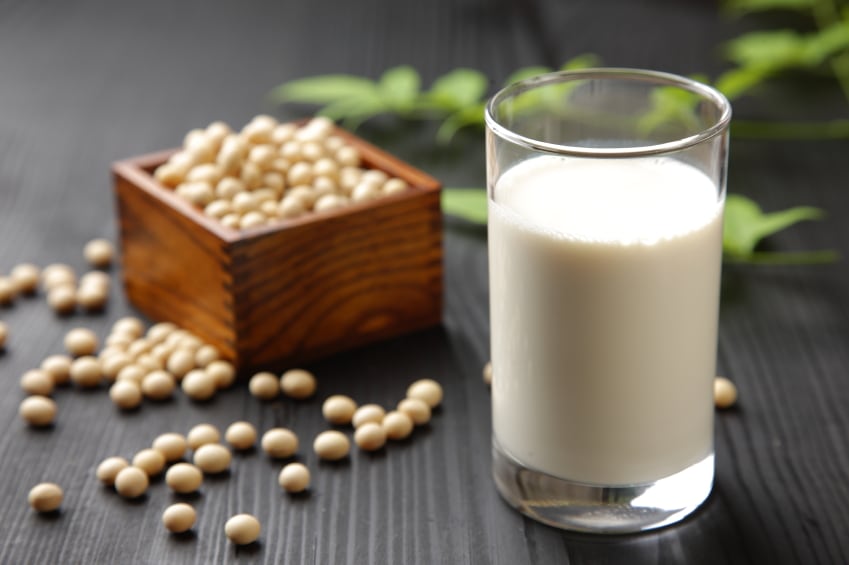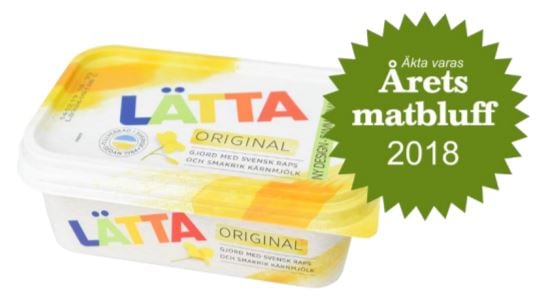Swedish consumer organisation Äkta Vara has voted Danone-owned Alpro its ‘anti-prize’: food bluff of the year.
The ‘award’, known as Årets matbluff in Swedish, has been voted on annually by Swedish consumers since 2015. In 2019, 19,100 Swedes cast their vote, with Alpro Cuisine Soya Whippable attracting approximately 50% (9,416) of total votes.
What’s the bluff?
Äkta Vara’s ‘anti-prize’ is given to products that are misleading consumers – within legal boundaries, explained the consumer organisation’s deputy chairman and executive member Björn Bernhardson.
In this particular case, consumers felt misled into believing Alpro Cuisine Soya Whippable contained a considerable amount of soy – or at least equivalent to that found in Alpro’s plant-based milks.
“In the case of Alpro Cuisine Soya Whippable, we think many consumers do not expect a soy alternative to cream to contain significantly less soy than a soy drink (2% as opposed to 8%),” Bernhardson told FoodNavigator.“If anything, you [would] think it would [contain] more.”
Danone’s head of corporate affairs, Nordics, Maria Mossenberg, said the company’s priority is ‘truthful communication’, stressing that the business’ intention has ‘never been to confuse or deceive anyone’.
“In terms of the soy content, 2% of soy corresponds to the protein content present in traditional dairy whipping cream,” she explained.
“Increasing the soy content would have increased the amount of protein and in turn reduced the whippablity.”
Alpro Cuisine Soya Whippable ingredients list:
Water, vegetable oils and fats (fully hydrogenated palm kernel oil, palm kernel oil), maltodextrin, sugar, hulled soybeans (2%), emulsifier (sucrose esters of fatty acids, lactic acid esters of mono- and diglycerides of fatty acids), sea salt, flavouring.
2% soy, yet 25% palm oil
Swedish consumers also voiced concerns that Alpro Cuisine Soya Whippable contains 25% palm oil, yet makes no mention of this ingredient on the front of its packaging.
“Palm oil is being criticised, primarily for environmental reasons, and many consumers avoid products containing it. I think the negative image surrounding palm oil made people feel more cheated” - Äkta Vara deputy chairman and executive member Björn Bernhardson
Indeed, palm oil’s frequent association with deforestation, biodiversity loss and climate change has damaged its reputation in Europe – prompting brands and consumers to boycott the ingredient.
Danone’s Mossenberg confirmed that palm kernel oil/fat is listed on the packaging of its whipping ‘cream’. “We use palm oil in this product as it is the only ingredient that gives us the desired functionality,” she told FoodNavigator.
“It is plant-based, pourable, easy to whip, and finally, it stays whipped when used. It is not easy to produce and we are unique in offering such a plant-based alternative to the market.”
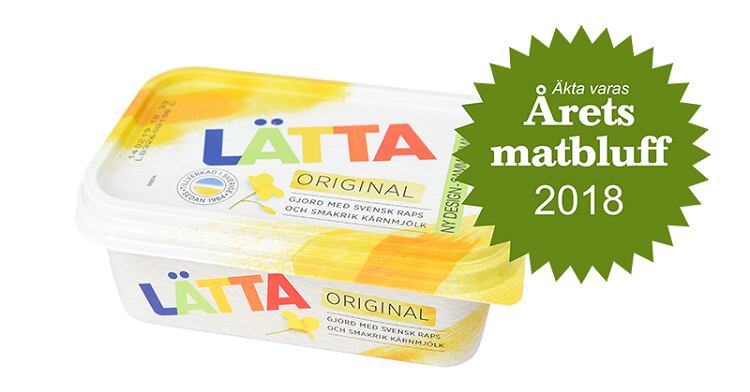
This is the second year in a row that an ‘anti-prize’ has gone to a food product containing significant levels of palm oil, without the ingredient being reference front-of-pack.
In 2018, Äkta Vara’s ‘anti-prize’ went to Upfield-owned spreads brand Lätta. According to the consumer organisation, consumers reacted angrily to the fact that Lätta spread contained more palm oil than rapeseed oil, but highlighted rape as a key ingredient on-pack.
However, Bernhardson assured us that the consumer organisation is not ‘particularly focused’ on the use of palm oil in food products.
“I would like to point out that none of the other finalists this year or last year contained palm oil,” he told this publication. “To our surprise, a lot of people voted for those two products as the most misleading out of the finalists.”
“The fact is that many consumers avoid products that contain palm oil and apparently don’t like it when food companies are hiding it in and on their products” - Äkta Vara deputy chairman and executive member Björn Bernhardson
Bernhardson suggested that consumers are ‘disappointed’ with the main ingredient – in this case palm oil – is omitted front-of-pack because it has a ‘negative tone’. “Consumers want honesty.”
Danone to rethink communication
How does Äkta Vara propose Alpro modify its marketing of Alro Cuisine Soya Whippable?
“More transparency,” Bernhardson told this publication. “As the main ingredient in the product by far, maybe [palm oil] should be featured somehow on the front-of-pack, instead of only soy?
“If it contained coconut oil [instead], it would be stated on the front,” he continued.
“Alpro have commented that their palm oil has excellent properties, is sustainable RSPO [Roundtable on Sustainable Palm Oil] certified, so why not brag about it and call it ‘Best Quality Palm Whip’?” - Äkta Vara deputy chairman and executive member Björn Bernhardson
Danone’s Mossenberg confirmed that the palm ingredient in Alpro Cuisine Soya Whipping Cream is certified to the RSPO standard, adding that the World Wide Fund for Nature (WWF) supports the use of sustainable palm oil for a number of social and ecological reasons.
“In terms of sustainability, agricultural efficiency is a major benefit of the use of palm oil: palm oil yields more oil per hectare than any other crop.”
“Ending the use of palm oil could have unintended consequences for forests and/or communities as more land would be required to produce the same amount of oil with other crops.”
Other 2019 finalists include:
Skånemejerier Bara yoghurt frukt & bär hallon & jordgubb: The name translates to ‘only yoghurt fruit & berries raspberries & strawberries’, and the packaging reads: ‘no added sugar’. However, the product contains just 8% berries and is sweetened with 12% fruit juice concentrate, resulting in a sugar level ‘almost as high’ as conventional fruit yoghurt, says Äkta Vara.
Pågen Brioche hamburgerbröd: These so-called ‘brioche’ style hamburger buns are far from real brioche, says Äkta Vara. They don’t contain butter and eggs, and are ‘almost identical’ to conventionally manufactured hamburger buns, in terms of ingredients, as well as fat and sugar content. “The only real difference is the cornmeal topping, instead of sesame seeds, and some added butter flavouring.”
Rå Blåbär pressad råsaft: The trademark for this blueberry juice means ‘raw’ in Swedish and the word ‘råsaft’ also suggests that this product is more ‘raw’ than other fruit juices. However, Äkta Vara says the fruit juice is ‘not raw at all’: “Instead, it is pasteurized.”
Semper gluten-free Bovete & Teff mjöl: Despite its name, ‘Buckwheat & teff flour’, the product contains just 45% flour, of which 23% is buckwheat flour, 19% is rice (not mentioned on the front of the package) and only 3% is teff. The remaining 55% is composed of different starches, fibres and thickeners.


